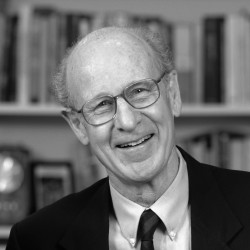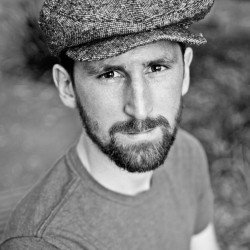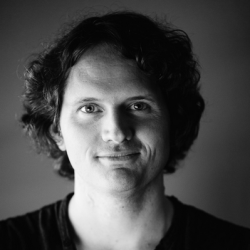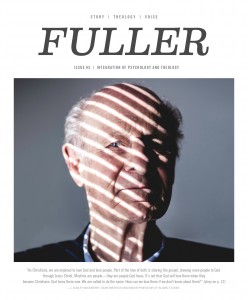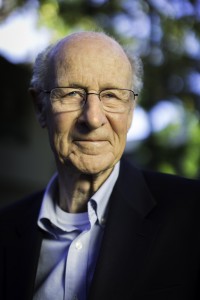 In 2014, an American evangelical missionary walked into the Foreign Ministry buildings in Tehran, at the invitation of the Iranian Foreign Minister, to facilitate understanding between those countries at the beginning of nuclear negotiations. The last time he had received a similar invitation was almost 35 years before—when US government personnel asked him to help prepare an overview of the Muslim world for President Carter after the capture of 52 American hostages in Tehran, and to suggest ways of improving the relationship. Now he was on the other side of a teaching career building bridges between the Western world and the Middle East, leading the way in a new age of Islamic studies, and training countless evangelical missionaries to work in the Islamic world. Even as a member of an academic bridge-building team, a Christian missionary was the last person anyone expected to see as a guest in the heart of the Ayatollah’s domain. Fuller’s senior professor of Islamic studies carried a briefcase of gifts for the Iranian dignitaries he would meet. When subsequently he was introduced to one of the religious leaders, the Iranian exclaimed, “Yes, Professor Woodberry, we have read all about you!” The moment perfectly captured the surreal nature of Dudley Woodberry’s life as a missionary and scholar in places where few others had dared to go.
In 2014, an American evangelical missionary walked into the Foreign Ministry buildings in Tehran, at the invitation of the Iranian Foreign Minister, to facilitate understanding between those countries at the beginning of nuclear negotiations. The last time he had received a similar invitation was almost 35 years before—when US government personnel asked him to help prepare an overview of the Muslim world for President Carter after the capture of 52 American hostages in Tehran, and to suggest ways of improving the relationship. Now he was on the other side of a teaching career building bridges between the Western world and the Middle East, leading the way in a new age of Islamic studies, and training countless evangelical missionaries to work in the Islamic world. Even as a member of an academic bridge-building team, a Christian missionary was the last person anyone expected to see as a guest in the heart of the Ayatollah’s domain. Fuller’s senior professor of Islamic studies carried a briefcase of gifts for the Iranian dignitaries he would meet. When subsequently he was introduced to one of the religious leaders, the Iranian exclaimed, “Yes, Professor Woodberry, we have read all about you!” The moment perfectly captured the surreal nature of Dudley Woodberry’s life as a missionary and scholar in places where few others had dared to go.
SAVED FOR A PURPOSE
Born to second-generation missionaries to China, John Dudley Woodberry carries a reckless love for other human beings in his blood. This selflessness—which led his grandparents to leave their mother country and his father to serve as a chaplain for Chinese POWs during the Korean War—was infused in Dudley’s veins and would direct the course of his life.
Having first become a Christian “in a childlike way” when he was three years old, Dudley says that the freezing waters of the Yantai Harbor catalyzed his faith in the winter of 1939. Five-year-old Dudley fell through the ice, which led to pneumonia. Barely surviving the illness, Dudley became convinced that divine intervention saved his life. Even at five years of age, “I had a sense,” he says, “that I had been saved for a purpose.”
It was not the first nor the last providential moment in his life, a life that would read as much like an adventure novel as a memoir. Two years later, when the Japanese bombed Pearl Harbor and declared war on the United States, Dudley and his family were made prisoners of war by the occupying Japanese army in China. Parents and children were separated; Dudley and his siblings became POWs in a different part of the country from their parents. Months later, a civilian prisoner exchange was negotiated between the United States and Japan. A Japanese officer arranged for a long journey by bus and train for the four siblings to reunite with their parents. At one point their train was delayed on a side track to allow another train to run ahead on the same track. The next morning the train stopped again, and the children were told to walk on foot. They eventually walked past the wreckage of the previous train, which had been derailed over a large embankment by Chinese guerrillas.
Once reunited with their parents they traveled to Shanghai, where they boarded an Italian ship bound for Portuguese East Africa—and subsequently learned that an American submarine named Plunger was on the verge of torpedoing that ship when it received word that it contained American civilians. In East Africa they exchanged ships with Japanese civilians from the United States and Canada who had come on a Swedish ship. Then, shortly before landing in New York, they passed the burning remains of an American freighter destroyed by a German U-boat. Through all this, Dudley perceived confirmation that he was being preserved for a specific task: that God was keeping him around for something.

LEARNING TO GO
Dudley discovered that “something” at age 13, when he heard the missionary pioneer Samuel Zwemer say, “If you want the most difficult but most rewarding work in the world, minister among Muslims.”
In 1955 Dudley enrolled in the Bachelor of Divinity program at Fuller, as the School of World Mission would not be founded to train missionaries and missiologists until a decade later. Students at Fuller and Princeton
Theological Seminary at that time collaborated to create the International Studies Program, which gave the opportunity for two students from each school to travel to a mission field and complete studies in indigenous cultures. Dudley, one of the program’s founders, was selected; for the next two years he studied at the American University of Beirut, where he began a master’s degree in Arab Studies.
In Lebanon, Dudley focused on formal Islam. There was a lack of teaching on “folk Islam”—the systems of belief and practice of many Muslims in their local contexts. These more pedestrian views fascinated Dudley, but studying them was simply not an option; the academic focus was on erudite traditionalists and imams. Yet when he actually hit the ground as a missionary years later, he realized how pervasive folk Islam was. In his mission fields he would find that many followed some mixture of orthodox Islam and superstition, which proved to be a massive obstacle in understanding and reaching them.
Lebanon was also the place he met his wife and ministry partner, Roberta, where she was studying at Beirut College for Women. Dudley returned and finished his BD (later upgraded to an MDiv) at Fuller as Roberta completed her studies in Lebanon. More study led him to the conviction that Westerners in general—and evangelicals in particular—often misunderstood Muslims and Islam. Westerners often saw Muslims as an unsophisticated people, completely ignoring their highly varied and developed cultures rich with art, tradition, and theological reflection. Dudley still had the heart of a missionary, but his time in Lebanon convinced him that rigorous intellectual preparation would lead to more effective witnessing.
When he graduated from Fuller, Harvard accepted him to study under the preeminent Western scholar of Islam Sir Hamilton Gibb. Dudley did well in his studies, writing his dissertation on the theology of Hasan al-Banna, the founder of the Muslim Brotherhood—and meeting secretly with some of its leaders—but again found an absence of material on folk Islam. Furthermore, his commitment to missions was sometimes frowned upon. It was thought by some that one should appreciate Arab culture, not convert it. His missional commitment was not crushed, but it was modified; Dudley learned to love and appreciate the indigenous culture of the Islamic nations for what they were, while still yearning to bring the redeeming love and light of Christ to them.

Read Dudley Woodberry’s sidebar The Fullness of Time For Muslims: 9/11, Paris, and San Bernardino as its Heralds
REACHING THE UNREACHABLE
Finally it happened when he graduated from Harvard: after years of 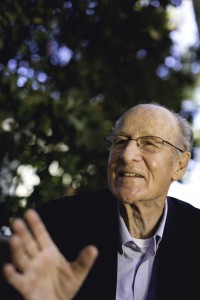 training and discernment, two master’s degrees, one doctorate, and two children, Dudley and Roberta became full-time missionaries to Pakistan, funded by the Presbyterian Church. Dudley worked at the Christian Study Centre in Rawalpindi, just outside the capital of Islamabad. Determined to work closely with Muslims, he made great progress in building bridges between Christianity and Islam. At times, those bridges were used for dialogue and mutual respect; at other times, they were used for bringing Muslims to the Christian faith. It was a tremendous accomplishment for Dudley and his colleagues in the area, particularly because of a hurdle that Dudley’s graduate studies had failed to address—the ubiquity of folk Islam.
training and discernment, two master’s degrees, one doctorate, and two children, Dudley and Roberta became full-time missionaries to Pakistan, funded by the Presbyterian Church. Dudley worked at the Christian Study Centre in Rawalpindi, just outside the capital of Islamabad. Determined to work closely with Muslims, he made great progress in building bridges between Christianity and Islam. At times, those bridges were used for dialogue and mutual respect; at other times, they were used for bringing Muslims to the Christian faith. It was a tremendous accomplishment for Dudley and his colleagues in the area, particularly because of a hurdle that Dudley’s graduate studies had failed to address—the ubiquity of folk Islam.
Folk Islam was a dominant form of practice in places where Dudley ministered. Not having taken seriously the ordinary expressions of ordinary people’s religion, the Western world had not prepared its international representatives—diplomats, missionaries, aid workers—to successfully interact with a significant segment of Muslims. The religion of many of the Muslims Dudley encountered extended beyond the Qur’an. They prayed to ancestors and worshipped spirits. They practiced magic and believed in demonic powers at work in their lives. It was unlike anything Dudley had ever been taught. Academic resources on these phenomena were few and far between, so Dudley set about recording the facets of what is now called “Muslim popular piety.” He collected talismans, books, and prayers, and in the meantime discovered a world outside the mosque that believed in and feared magic, spirits, demons, and curses.
SCHOLAR, PASTOR, ADVOCATE
Dudley’s scholastic endeavors also unexpectedly proved crucial for his own safety and the safety of others. During his first tour in Afghanistan, two missionaries were arrested for distributing copies of the Gospel of Luke. Though he never appeared in court, Dudley hired a defense lawyer and developed the defense himself, based on Qur’anic verses that allowed Christians and Muslims to coexist peacefully. The missionaries were released.
A similar situation presented itself in Saudi Arabia, where Dudley was called to serve as the first sanctioned resident pastor in the Arabian interior since shortly after the Islamic conquests of the seventh century. The church in the capital of Riyadh and elsewhere grew at an astounding rate, to an extent that made the government uncomfortable. To help ease tensions, Dudley showed them letters ascribed to Muhammad that gave Christians the right to worship in their own churches as long as they were loyal and met certain financial and other obligations. The Christians were then allowed to continue a lower-profile worship. When Dudley and his family returned to the United States because of Roberta’s health and their children’s educational needs—after 11 years of ministry in Pakistan, Afghanistan, and Saudi Arabia—King Khalid thanked him for his work.
Dudley began teaching in Michigan in 1979, during the Iranian Revolution: when the American Embassy personnel in Tehran were taken hostages, the Grand Mosque in Mecca was taken over by militants, and the American Embassy in Pakistan was burned down. Subsequently he and his family moved to Pasadena, where he initially taught at Fuller while serving at the Zwemer Institute, then became a full-time professor of Islamic Studies in Fuller’s School of World Mission in 1985.
Though he oversaw key initiatives in the School of World Mission (SWM) as its dean from 1992 to 1999, Dudley’s impact was perhaps greatest in the study of Muslims and their contexts. His research in Muslim popular piety built on the study of Folk Religion already taught in SWM. Muslims were seen as combining the formal tenets of the faith with the superstitions and fears of their environs. Dudley’s field research filled gaps in the discipline, greatly influencing Fuller’s own approach. He further oversaw research in South Asia and West and East Africa demonstrating that Muslims were coming to faith in Christ not only in an “attractional model”—being attracted to a church or to Christians—but also in a “transformational model”: studying the Bible stories of people mentioned in the Qur’an within trusted groups of fellow Muslims, and thus gradually coming to faith in Christ as Savior.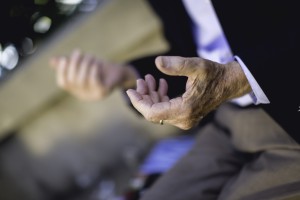
After Dudley retired from the deanship of SWM, Roberta accepted a request to teach their grandson and other expatriate children during the academic year at a school in Pakistan—allowing their son to continue to direct PACTEC, a humanitarian aviation and communication agency serving Afghanistan when it was primarily controlled by the Taliban. Joining his wife in Pakistan in the months between teaching intensive courses at Fuller, Dudley was able to keep current on the Muslim World. After 9/11, when the Taliban were driven from much of Afghanistan, PACTEC and the school where Roberta taught moved there, and Dudley continued to commute for two more academic years between Fuller and Kabul.
During this time Fuller became very involved in peacebuilding with Muslims both in the United States and overseas. Later Dudley was privileged to be asked to edit the most comprehensive study to date of how Muslims were coming to faith in Christ, entitled From Seed to Fruit: Global Trends, Fruitful Practices, and Emerging Issues among
Muslims (2008, 2011).
Because Dudley is quick to tell a story and slow to take credit, it bears telling that he influenced movements in missions, academia, and diplomacy that affect the discussion of how Christians and the West interact with Muslims. When Provost Doug McConnell, then dean of the School of Intercultural Studies, was asked how he could possibly replace Dudley at Dudley’s retirement, McConnell responded he already had—but it required four new faculty members to do it. “We would have gone nowhere in Islamic Studies without him,” McConnell says. “He has always led by bringing others around him and asking them to join him on the  journey.”
journey.”
STILL ON THE JOURNEY
The tale of Dudley’s incredible life is exceeded only by the extraordinary depth of his work. It’s been suggested that he write a memoir: three arrests in three countries, hitchhiking from New York to Ecuador and through Iran, Pakistan, and India, working as a deckhand for passage from Panama to the United States, negotiating on behalf of hostages, weaving through civil wars and revolutions: all this surely warrants some sort of literary commemoration.
“Oh, no,” says Dudley, shaking his head. “I don’t think I’ll have time. I have too much work to do.”

